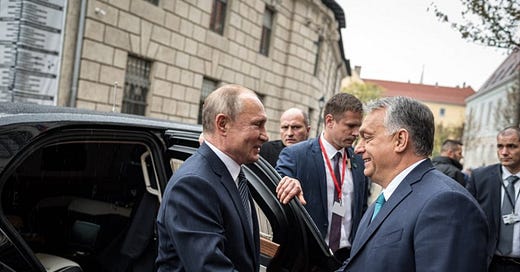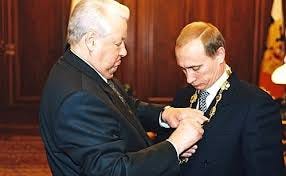Couple of days ago, the German investigative journalism project Corrective published an article about the peace negotiations between the USA and Russia. The article, created in collaboration with the Russian independent press project Istories, reveals the background of these negotiations.
The Trump administration aims to take control of critical energy infrastructure in Eastern Europe. The same Donald Trump scolded Europe for its dependency on Russian natural gas and crude oil.
This is the Donald Trump who aims to increase domestic oil production and promote energy independence. From an American perspective, owning critical assets that connect the EU and Russia seems logical. It allows the Beautiful and Yuge Empire of America to maintain control.
The German response is quite predictable. Norbert Röttgen, a strongman in the soon-to-be-governing conservative German CDU party, stated clearly that the EU and Germany must switch to higher gears immediately before Trump and Putin determine our fate above our heads.
Let me add a perspective from a small and unremarkable Central European country.
Dealing with Putin is fucking dangerous.
Yes, I used the f-word on purpose. One of the main reasons behind the shouting match between Messrs. Trump, Vance, and Zelensky was that Zelensky realized that Donald Trump was unaware of this truth.
Russian gas and oil pipes are a lifeline for Eastern Europe
The infrastructure in question was primarily constructed during the Soviet era. It connects Europe to the vast oil and gas fields around the Caspian Sea and in Siberia. The “Druzhba” (Friendship) network continues to be a lifeline for Hungary and Slovakia. Other Central European countries also rely heavily on it despite efforts to diversify their energy sources.
During the Soviet Era, this infrastructure served as a very short leash. Eastern Bloc countries had minimal access to other sources of gas and oil, and the refineries were fine-tuned to work with Russian crude oil.
After the turmoil of the 1990s, Putin came to power. With the assistance of some former KGB colleagues and smart energy executives who became oligarchs, he established a cunning and sophisticated system of corruption built on the same infrastructure.
In discussions about oil prices between OPEC countries and the rest of the world, the negotiations are relatively straightforward compared to oil and gas agreements in Central Europe.
Russian oil and gas are relatively inexpensive, because the transportation infrastructure is already established. There is no need for large tanker ships, costly insurance, or extensive port facilities—oil and gas flow directly to European users from remote Russian fields.
The low price and established infrastructure have created a dependency, allowing the Russians to sell their product at market prices or close to them. This gives the Russians a broad margin to operate with.
Buying back European influence
Most of Putin's power comes from the smart management of the leverage created by this margin. Here are some examples:
The transport fees from Russia to Ukraine and Belarus remain vital sources of hard currency, even during wartime.
The new Nord Stream pipeline network circumvents Ukraine and Belarus, making gas exports to Germany even cheaper without incurring international transport fees. This network runs under the sea directly from Russia to Germany. (and it was blown up by unknown actors to drag Germany into the anti-Putin coalition)
Creating “Putinverstehers”
The German "debt ceiling," a strict law of austerity enshrined in the German constitution in 2005, was enabled mainly by access to very cheap energy from Russia. Merkel's decade-long courtship with Putin, characterized by the "Putinversteher" mentality (German for someone who "understands Putin's ways"), was essentially rooted in Germany's energy dependency. See this article also from Corrective about how German politics is still full of “Putinverstehers.”
In Hungary and other small countries in Central Europe, the Russians employed a different method. They utilize a part of the wide margin for corrupt practices. Typically, a bipartisan agreement between the Russian government and the host government allocates a yearly quota of Russian gas exports to a joint venture company at a lower price. This company then sells the gas at market prices, and the profits are funneled through standard money laundering channels to the government of the small Central European country.
In return, these countries also become "Putinverstehers," similar to the Germans, where former Chancellor Gerhard Schröder (Angela Merkel's predecessor) served on the board of Russian gas giant Gazprom for over a decade.
If we examine Viktor Orbán's speeches from 2008, we see a young man in his prime (45 at the time) criticizing Russia and pledging Hungary's loyalty to the EU and Western values. However, just months later, after his landslide victory in 2010 (and a visit to St. Petersburg in late 2009), he developed a friendship with Putin. By now, he is an old and obese man who has become one of Putin's most valuable assets in the EU. Orbán has blocked joint decisions and slowed negotiations, all in Putin's interest.
Money is not the only incentive used by the Russian secret services. They are experts in manipulation and seduction. Their methods include orgies, luxury goods, and yachts…you name it. They thoroughly investigate their targets, discovering their vulnerabilities to establish an ironclad hold over them. The New Statesman published this great article on the methods. Here is a quote that says the whole story in short:
Captain John Foreman, ex-British defence attaché in Moscow, said that “every diplomat, Western or otherwise, is a potential target. This isn’t a random process. The Russian security services are always looking for human vulnerabilities. These can be unhappiness, money worries, weak physical security, a tendency of talking about sensitive matters in public, drink or drug problems, a taste for infidelity and/or a roving eye for the opposite sex. Once the FSB see a vulnerability, they will try and exploit it for intelligence advantage.”
Before February 2022 the Russian soft power in Europe was on its peak. “Putinversteher” think tanks, pro-Putin far-right parties, pro-Putin prime ministers and oligarchs were everywhere.
A typical Russian-influence story is the story of Metro line 3 in Budapest. The Metro line 3 in Budapest was overhauled back then from the EU development funds. The Russians couldn’t offer suitable new trains, so the Hungarian government allowed “refurbished” vehicles. The Russians won and took our Soviet-made metros for refurbishing. They changed every part between the front and back nameplates, effectively channeling EU money to the Russian railway industry. Of course, the " refurbishment " cost exceeded the new trains' price.
The war ruined most of Putin’s soft power
Many people, myself included, were initially skeptical about Putin's intentions to start a war in early 2022, despite the clear signs of military mobilization. This skepticism stemmed from the understanding that such a move would signal the end of Russia's European soft power built on energy deals.
After a brief period of hope for a short war, European industry had to look for different energy sources, and politicians had to distance themselves from Putin. Emanuel Macron, for example, took a “constructive approach” for almost a year before starting large-scale military aid, and he is now one of the self-proclaimed Protectors of Europe.
But much of this hardline anti-Putinism is a ploy. Europe needs Russian raw materials and energy, and European companies want to continue their lucrative cooperation with the Russian industrial complex. Although the Russian mindset is distinctly Eastern, even compared to the former Warsaw Pact countries and Russia still has its imperial ambitions, Russia is part of Europe and there must be a way to coexist.
You don’t “get” Putin. You either kick Putin or serve Putin.
Achieving a lasting resolution in this context is close to impossible. Russia's imperial ambitions persist, and anyone who has interacted with the country knows that the only language they speak is power. Finding a truly effective solution may be very difficult, if not impossible. Any resolution reached is likely to be temporary. Europe needs to learn this lesson: there is no such thing as “understanding Putin” or “having a good relationship with Putin.”
When someone like me, living in a small Central-Eastern European country, sees a sharply dressed Westerner (an American at that) who is confident and peppy and says they are heading to Moscow because “they really understand how Putin thinks and can make him an offer he can’t refuse,” I can only sigh.
Oh no, not again.








